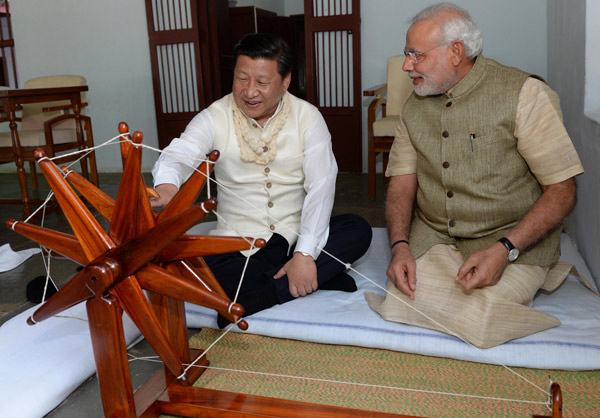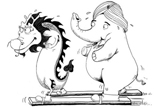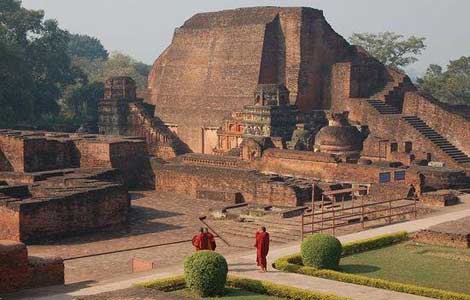
Benefit of teaming up goes beyond borders
Updated: 2014-09-19 02:10
By WU JIAO in New Delhi and ZHAO SHENGNAN in Beijing (China Daily)
Comments Print Mail Large Medium Small
 |
|
Accompanied by Indian Prime Minister Narendra Modi, President Xi Jinping moves a spinning wheel once used by Mohandas Gandhi, in a memorial paying homage to India's independence leader in Gujarat, India, on Wednesday. [Photo/Xinhua] |
China to assist India upgrade infrastructure, improve trade
Outside the red carpet and receptions full of personal touches, President Xi Jinping and Indian Prime Minister Narendra Modi mapped out a new era in relations on Thursday with major deals worth billions of dollars and pledges to control border disputes.
The 12 agreements, together with three signed on Tuesday at the start of Xi's visit, will substantially increase Chinese investment in India and help New Delhi address its key agenda of modernizing its infrastructure and narrowing its trade deficit with China, observers said.
|
Tidbits Nations plan more cultural exchanges China and India agreed on Thursday to strengthen culture and personnel exchanges. China will help India train 1,500 Chinese-language teachers, President Xi Jinping said on Thursday. In the next five years, China and India will each send 200 youths to visit the other each year. The two nations also will set up culture centers in the other's territory. Next year will be "Visit India" year in China, and 2016 will be "Visit China" in India. Xi invites Modi to visit his hometown of Xi'an President Xi Jinping invited Indian Prime Minister Narendra Modi on Wednesday to visit his hometown Xi'an, Shaanxi province next year. Xi said seventh-century Chinese monk and traveler Xuan Zang stayed in India for 16 years to seek Buddhist scriptures. "When he came back to China, he stayed in my hometown, Xi'an, to translate and spread Buddhist thoughts to Chinese people," Xi said. According to historical records, Xuan started his travels at the age of 28 in 629 AD and recorded his travels in Gujarat, where he describes towns and cities like Bharuch, Malwa, Idar and Valabhi. Prime minister cites progress in ties Ahead of President Xi Jinping's visit, Indian Prime Minister Narendra Modi described Sino-Indian ties on Tuesday as moving ahead from "INCH (India and China) toward MILES (Millennium of Exceptional Synergy)", Indo Asian News Service reported. In a conversation with Chinese journalists based in New Delhi, Modi said: "India and China are bound by history, connected by culture, and inspired by rich traditions. Together they can create a bright future for the entire mankind." |
Xi and Modi agreed on Thursday to properly manage and control border disputes between the nations, maintain peace and security in border regions, and find a solution soon.
"China has the determination to work with India through friendly consultation to settle the boundary question at an early date," Xi said after his meeting with Modi, which lasted more than two hours.
Calling his talks with Xi a "historic opportunity", Modi said "we can start a new era in our relations" and said India will not allow Tibetans to conduct anti-China political activities in the South Asian country.
Wang Xu, a researcher on South Asian studies at Peking University, said border disputes are not likely to overshadow the booming Sino-Indian cooperation as cooperation with economic engines is the top priority for Modi, who promised in the election campaign to crank up growth.
Among the agreements that range across a number of sectors, were plans to boost India's rail network, including upgrading stations and developing high-speed railways.
The existing Chennai-Bangalore-Mysore railway line will be among the first to have speeds increased, and the countries will launch training programs in heavy-haul transportation, Xi told reporters.
Ye Hailin, a researcher in South Asian studies at the Chinese Academy of Social Sciences, said China's financing, technologies and experience could be of immense benefit to India's limited rail network, which has held back much-needed economic growth.
India's infrastructure upgrading projects are huge, and opening a usually closed door for China in the rail sector has shown New Delhi's trust in Beijing, Ye said.
"We can bring prosperity to Asia, and we can create opportunities for the world," Xi said of the growing relationship between the world's two most populous nations.
China is India's top trading partner, with trade volume reaching more than $70 billion in 2013. But India's trade deficit with China hit $31 billion last year.
As parts of efforts that observers said aim at balancing trade and reaching a trade target of $100 billion by 2015, China announced the establishment of two industrial parks?- in the western Indian state of Gujarat and the central state of Maharashtra?- that produce power transmission equipment and auto parts.
Both countries decided to begin discussions on civil nuclear energy and signed a five-year economic and trade development plan. The leaders also discussed a China-led proposal to develop an economic corridor linking Bangladesh, China, India and Myanmar.
Contact the writers at wujiao@chinadaily.com.cn and zhaoshengnan@chinadaily.com.cn
Related Stories
Xi expects better Sino-India relations 2014-09-18 12:14
President Xi and wife play swing in Modi's home state 2014-09-18 12:10
Xi visits Modi's home state, extends birthday wishes 2014-09-18 09:49
Xi, Modi set formality aside, setting friendly tone for visit 2014-09-18 03:38
President Xi starts Indian visit 2014-09-17 17:20
Xi calls for implementation of cooperative projects with Sri Lanka 2014-09-17 17:17
Big Talk





